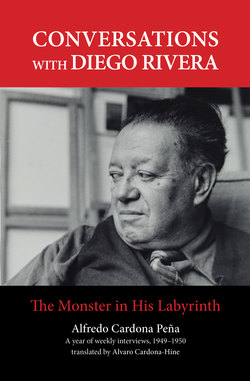Читать книгу Conversations with Diego Rivera - Alfredo Cardona Peña - Страница 2
На сайте Литреса книга снята с продажи.
ОглавлениеENDORSEMENTS
Three months after I arrived from Guatemala to study in La Esmeralda, with a scholarship from the democratic government, I was asked to work as an assistant on Diego Rivera’s mural Dream of a Sunday Afternoon in Alameda Central Park. Diego was starting the mural in the Hotel del Prado where the famous phrase “God does not exist” scandalized Mexico.
A year after, I was able to assist the genius in “his labyrinth” and to listen to the corpulent maestro dressed in denim overalls speak to Alfredo Cardona Peña. We called the writer jucjhitico, for having been married to a beautiful woman from Juchitan, Oaxaca, and tico for being from Costa Rica, one of the most beautiful places in Central America.
The union of these talented men allowed Alfredo Cardona Peña to capture in this book—with sarcasm, knowledge, wisdom, and ingenuity—anecdotes and experiences of Diego’s artistic, intellectual, and political life in Mexico and the world. I witnessed the birth of this book take place in front of a picture window in the maestro’s beautiful studio in San Angel, through which a green-yellow foliage peeked, Diego Rivera’s favorite color, and mixed with the Congo-green of the floor. In this ambiance, I heard the writer ask targeted questions. I was still very young, enjoying and learning by listening, while I discretely muffled a smile.
—Rina Lazo, painter and last living student of Diego Rivera
When Rina painted the mural The Four Elements, the critics applauded her … even the painters. Needless to say, Diego saw her as the apple of his eye
—María Luisa, La China Mendoza
“If art is not made, there is a danger of death,” Diego Rivera tells us in this splendid book, which is itself a powerful argument for life, and for the kinds of vital, authentic art without which fully human lives are impossible. These pages are practically bursting with Rivera’s colossal genius, and his words, reaching us only now in English after almost 70 years, are as necessary today as they were in 1950. Read this book; your heart, your soul, and your mind will all thank you for it.
—Ben Fountain, author of Billy Lynn’s Long Halftime Walk, winner of the National Book Critics’ Circle Award and finalist for the National Book Award
This book is a marvelous stroll with Mexican artist Diego Rivera, a gift offered by Alfredo Cardona Peña with empathy, intelligence, and an infinite curiosity for Mexico—its indigenous and popular culture, art as propaganda, and painting as boundless energy. Rivera is rendered in full flesh: combative, keen, urgent and vital.
—Gabriel Trujillo Muñoz, author of Mezquite Road
The appearance in English of these wide-ranging and brilliant interviews of Mexico’s greatest painter, Diego Rivera, by Alfredo Cordona Peña is a triumph for all who wish to understand the Mexican master. In this case, the writer was respected so much by the artist that the results are a kind of dance between two equals. The elegant translation by the writer’s brother, Alvaro Cardona-Hine, is an act of homage that makes these interviews, known to every scholar of Rivera’s work in Spanish, accessible to a wider audience in English. The resulting text is very much like Paul Gauguin’s wide-ranging last book, Avant et Après, and a book less about art than about history, art history, aesthetics, politics, literature, the art market, and memory. It is filled with surprising stories, fiercely held opinions, and a kind of intellectual swagger perfectly captured in its subtitle “The Monster in his Labyrinth”
—Richard R. Brettell, PhD, Founding Director, the Edith O’Donnell Institute of Art History and the Margaret McDermott Distinguished Chair, the University of Texas at Dallas
